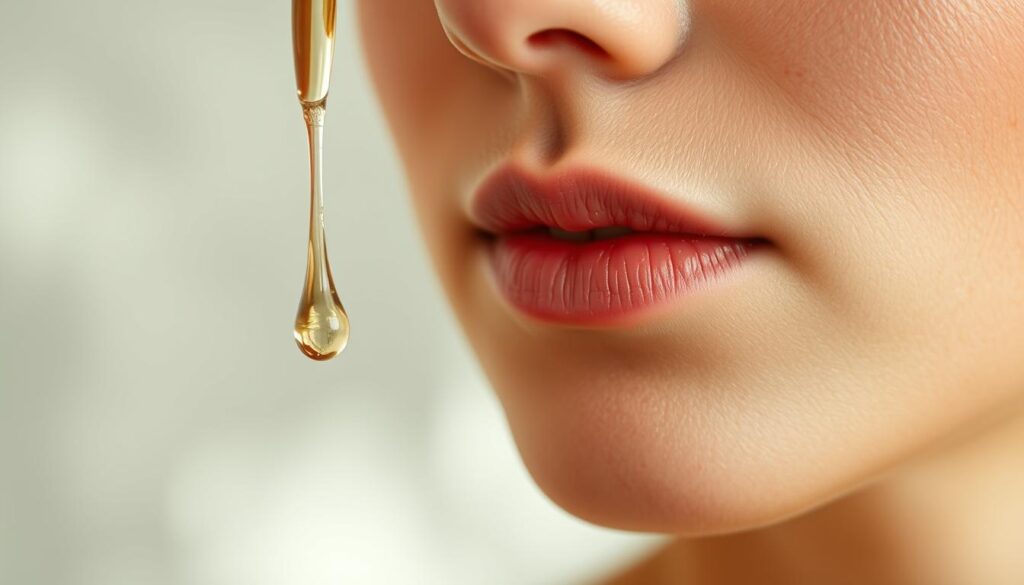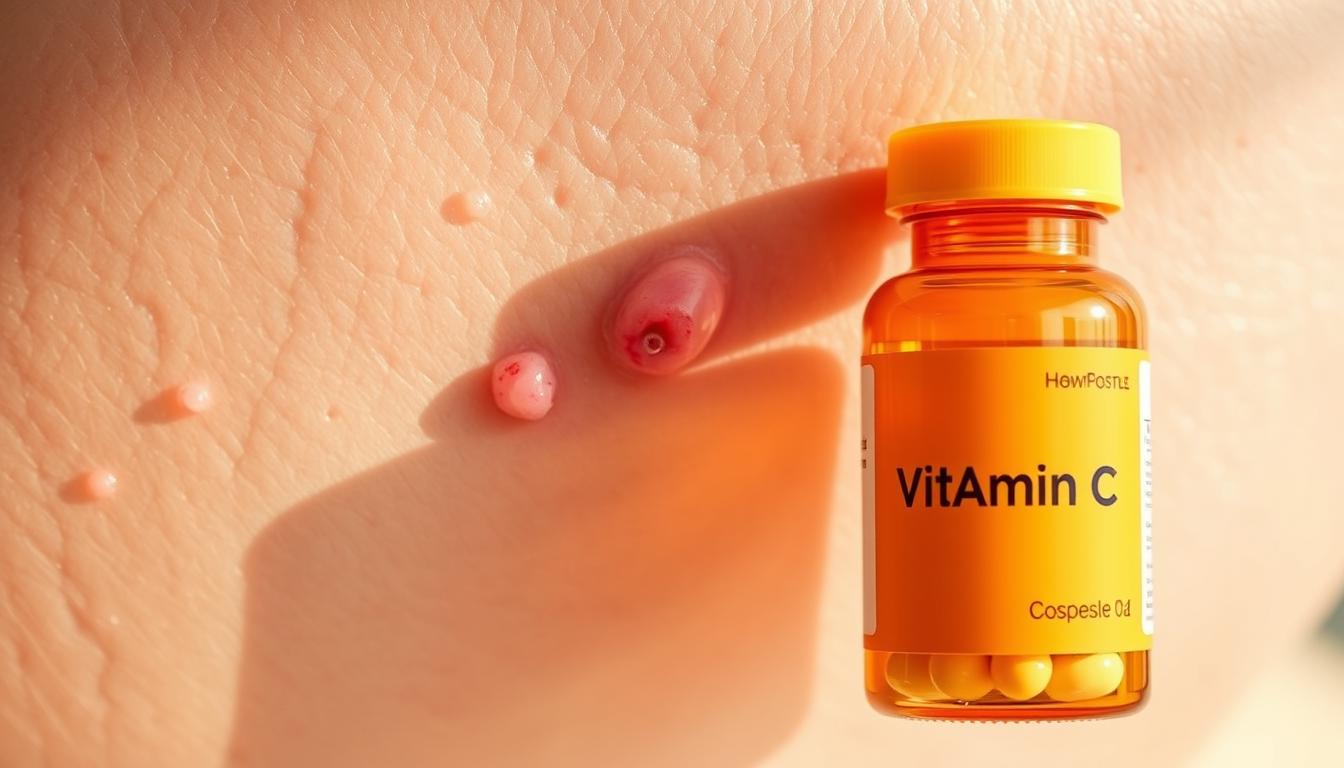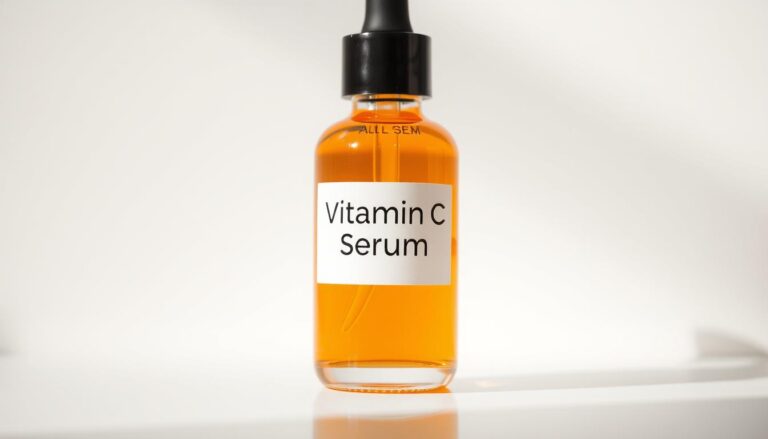Does Vitamin C Help with Acne? Facts & Tips
Are you struggling with acne and wondering if vitamin C can be the solution you’ve been searching for?
Many people with acne are curious about antioxidant-rich ingredients. Vitamin C is known for its strong antioxidant powers. It can soften fine lines and wrinkles. But can it also help with acne treatment?
Studies show vitamin C’s antioxidants might reduce inflammation and improve skin health. This could help manage acne.
Table of Contents
Understanding Acne and Its Causes
Acne is more than just a skin issue; it’s complex. To manage it well, you need to know its causes and types.
Types of Acne and Common Triggers
Acne comes in many forms, like blackheads, whiteheads, papules, pustules, nodules, and cysts. Things like hormonal changes, stress, and some meds can trigger it. Knowing these can help you start fighting acne.
- Hormonal changes
- Stress
- Medications
- Genetic predisposition
The Role of Oxidative Stress in Acne Development
Oxidative stress is key in acne by causing inflammation and skin damage. It makes your skin produce more sebum and clog pores, making acne worse.
Products with antioxidants, like vitamin C, can fight oxidative stress. This might lessen acne. Vitamin C is getting attention for its anti-inflammatory and skin health benefits.
Does Vitamin C Help with Acne? The Science Explained
Vitamin C fights acne by targeting its causes, like inflammation and bacteria. It has anti-inflammatory effects. This helps lessen acne’s redness and swelling.
Research on Vitamin C’s Effects on Skin
Research shows vitamin C benefits the skin by lowering oxidative stress. This stress is a key player in acne. Vitamin C’s antioxidant properties fight off free radicals that harm the skin.
How Vitamin C Targets Acne-Causing Factors
Vitamin C fights P. acnes, a common acne-causing bacteria. By reducing this bacteria, it helps prevent acne.
| Benefit | Description |
|---|---|
| Anti-inflammatory | Reduces redness and swelling |
| Antibacterial | Fights against P. acnes bacteria |
| Antioxidant | Neutralizes free radicals, reducing oxidative stress |
Knowing how vitamin C tackles acne can guide your skincare choices. It’s a powerful tool against acne.
The Antioxidant Power of Vitamin C for Skin Health
Vitamin C is key for protecting the skin from harm. It fights off free radicals, which can damage cells and cause inflammation. This is great for people with acne, as it helps reduce stress that makes acne worse.
How Antioxidants Combat Inflammation
Antioxidants like vitamin C are important in fighting inflammation. This is a big part of why acne happens. Using a vitamin C serum for acne can help a lot. It gives your skin a boost of antioxidants right where it needs it.
Vitamin C’s Role in Collagen Production
Vitamin C is also important for making collagen. Collagen keeps the skin strong and elastic. It helps reduce fine lines and scars, including acne scars.
Adding vitamin C to your skincare can help fight inflammation and boost collagen. This leads to healthier, clearer skin.
Benefits of Vitamin C for Acne-Prone Skin
Vitamin C offers many benefits for acne-prone skin. It can reduce inflammation and control oil production. Adding vitamin C to your skincare routine can help with common acne issues.
Anti-inflammatory Properties
Vitamin C has anti-inflammatory properties. It can soothe acne-prone skin. Reducing inflammation is key in managing acne, as it prevents further irritation and aids in healing. Research shows vitamin C can lessen acne redness and swelling.
Oil Regulation and Pore Reduction
Vitamin C also helps regulate sebum production and reduces pore appearance. It controls oil, preventing clogged pores and acne. Vitamin C also improves skin texture, making pores seem smaller.
Protection Against Environmental Damage
Vitamin C protects against pollution and UV damage, which can worsen acne. It keeps the skin’s natural barrier strong, reducing acne breakouts.
| Benefit | Description |
|---|---|
| Anti-inflammatory Properties | Reduces redness and swelling associated with acne |
| Oil Regulation and Pore Reduction | Controls sebum production and minimizes pore appearance |
| Protection Against Environmental Damage | Shields skin from pollution and UV damage |
Adding vitamin C to your skincare routine is easy. Use a vitamin C serum or cream. Choose a stable product with a suitable concentration for your skin. This way, you can enjoy vitamin C’s benefits for clearer, healthier skin.
Vitamin C Serum for Acne: Choosing the Right Formula
For those with acne, the right vitamin C serum can be a game-changer. It can make your skin clearer and healthier. Vitamin C serums are popular because they fight off skin problems like acne.
Concentration Levels and Their Effects
The vitamin C level in a serum matters a lot. Concentrations between 10% to 20% are usually good for treating acne without irritating your skin. But, higher levels might work better but could also make your skin more sensitive.
Key Ingredients to Look for in Vitamin C Serums
When picking a vitamin C serum, look for L-ascorbic acid. It’s the most active form of vitamin C. Serums with vitamin C and vitamin E together work better. Also, look for soothing ingredients like aloe vera or green tea extract.
Best Formulations for Different Skin Types
Everyone’s skin is different, so you need the right vitamin C serum. If you have sensitive skin, choose fragrance-free serums with soothing ingredients. For oily skin, go for light, oil-free serums. Dry skin benefits from serums with extra moisturizers.
By thinking about these things, you can find a vitamin C serum that fights acne and improves your skin overall.
Vitamin C Supplements for Acne: Oral vs. Topical Application
When thinking about vitamin C supplements for acne, it’s key to know the difference between oral and topical use. Topical vitamin C is often used for acne, but taking it orally can also help your skin health.
How Dietary Vitamin C Affects Skin
Dietary vitamin C is vital for skin health. It helps make collagen, improves skin flexibility, and boosts the skin’s defense. Eating foods high in vitamin C, like citrus fruits and leafy greens, can help your skin from the inside.
Recommended Dosages for Acne Management
Adults should get 60-90 mg of vitamin C daily. But, some research shows higher doses might help with acne. Always talk to a doctor before starting any supplements.
Potential Interactions with Other Supplements
Vitamin C supplements can affect how other medicines and supplements work. For example, it might make iron absorption too high, which is bad for people with hemochromatosis. Here’s a table of possible interactions:
| Supplement/Medication | Potential Interaction with Vitamin C |
|---|---|
| Iron supplements | Enhanced absorption, potentially leading to iron overload |
| Blood thinners (e.g., warfarin) | Possible reduction in efficacy |
| Certain chemotherapy drugs | Potential interference with treatment efficacy |

Always talk to a healthcare professional before taking vitamin C supplements, especially if you’re on other meds or supplements.
How to Incorporate Vitamin C into Your Acne Treatment Routine
Adding vitamin C to your daily skincare can really help with acne. It’s important to know the best way to use it.
Morning vs. Evening Application
Using vitamin C in the morning shields your skin from pollution and damage. But, you can also use it at night to help your skin heal while you sleep. Choose the best time based on your skin type and needs.
Layering with Other Skincare Products
To get the most out of vitamin C, layer it right with other products. Put it on after you clean and tone, but before moisturizing and sunscreen. Be careful not to mix it with too many strong ingredients to avoid skin irritation.
Frequency of Use for Optimal Results
Consistency is key for the best results. Start with a small amount (10-15%) and slowly increase as your skin gets used to it. Begin with a few times a week and go to daily if your skin can handle it.
Knowing how to use vitamin C in your skincare routine can make a big difference. It helps fight acne and makes your skin healthier and clearer.
Vitamin C and Acne Scars: Healing and Prevention
Acne scars can be tough to get rid of, but vitamin C is a great help. It boosts collagen and fades dark spots. Vitamin C helps heal and prevent acne scars in many ways.
Fading Post-Inflammatory Hyperpigmentation
Vitamin C brightens the skin and lessens dark spots. It stops melanin, the dark pigment, from forming. Using vitamin C regularly can make your skin tone even and scars less visible.
Timeframe for Visible Improvements
How fast you see improvements from vitamin C depends on the scar and the vitamin C’s strength. Usually, using it for months shows clear results.
| Concentration of Vitamin C | Expected Timeframe for Improvements |
|---|---|
| Low (5-10%) | 3-6 months |
| Moderate (15-20%) | 2-4 months |
| High (25% or higher) | 1-3 months |
Combining with Other Scar-Reducing Treatments
Using vitamin C with other treatments like peels or lasers can work better. This mix can give you faster and better results.

Learning how vitamin C helps with acne scars can guide your skincare choices. It’s effective alone or with other treatments to lessen scar appearance.
Potential Side Effects and Limitations of Vitamin C for Acne
Thinking about adding vitamin C to your skincare for acne? It’s key to know its possible side effects. Vitamin C is usually safe but can upset sensitive skin.
Skin Sensitivity and Irritation
Some folks might get skin sensitivity or irritation from vitamin C products. This could be redness, itching, or a burning feeling. Start with a low dose and slowly up it as your skin gets used to it.
When to Avoid Vitamin C Products
Be careful or skip vitamin C if you have very sensitive skin or rosacea. Always check with a dermatologist before trying new skincare.
Managing Potential Adverse Reactions
If you get any bad reactions, stop using it and look for other options or talk to a dermatologist. Here’s a quick guide to handle side effects:
| Side Effect | Action |
|---|---|
| Mild Irritation | Reduce frequency of application or concentration |
| Severe Irritation | Discontinue use and consult a dermatologist |
| Skin Redness | Apply a soothing moisturizer or reduce application frequency |
Knowing these side effects and how to deal with them lets you use vitamin C safely. This way, you can fight acne and enjoy vitamin C’s benefits.
Conclusion: Maximizing Vitamin C’s Benefits for Clearer Skin
Understanding vitamin C’s role in fighting acne can guide your skincare choices. It targets several causes of acne. This makes it a valuable tool in your fight against breakouts.
You can add vitamin C to your routine with serums or supplements. Pick a product that fits your skin type and needs. Vitamin C can indeed help with acne, based on the research.
For the best results, use vitamin C regularly and be patient. It may take some time to see improvements. By doing this, you can unlock its power to enhance your skin’s health. Adding vitamin C to your skincare can be a simple yet effective step towards better skin.






